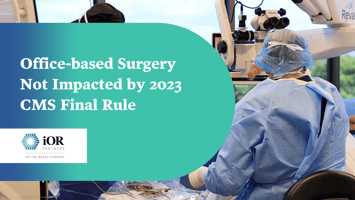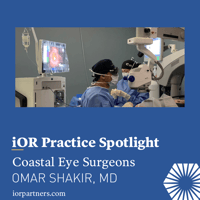iOR Partners is focused on perpetuating the shift to office-based surgery. This is a new standard...
Diving into Diversity: Profiles of Surgeons Practicing Office-Based Surgery

At ASCRS 2025, five surgeons with varied practice profiles presented the course “The Shift to Office-Based Cataract Surgery: Insights and Considerations from Multiple Surgeons Profiles”. Paul Singh, MD, Lance Kugler, MD, Alison Tendler, MD, Dagny Zhu, MD, Elson Lai, MD shared how they individually adopted and implemented office-based surgery (OBS) in their practices. From seasoned hospital veterans to innovative young practitioners, each surgeon brings their unique approach, redefining patient care. Read on to learn how OBS resonates so well across such diverse profiles.
Diverse Surgeon Profiles Practicing Office-Based Surgery
Office-based surgery supports various types of surgeons, each benefiting from its flexible model in unique ways. Here’s a closer look:
Mid to Late-Career Surgeons
These surgeons have built their careers in the hospital outpatient (HOPD) or ambulatory surgical center (ASC) and are now seeking alternatives that offer more autonomy and efficiency. Many of them experienced the transition from HOPDs to ASCs, and OBS is a natural evolution. They value:
- Convenience: No need to work within the rigid scheduling frameworks of traditional surgical settings.
- Patient Continuity: OBS allows for pre-op evaluations, procedures, and post-op care in a single location, fostering better doctor-patient relationships.
- Improved OutcomesSafe & Effective Outcomes: A growing body of research indicates that outcomes in OBS match or exceed those in other settings, which has led to its rapid adoption by this group.
Alison Tendler, MD described, “I didn’t plan on transitioning fully to OBS, but once I started operating in my customized office surgery suite, there was no turning back.”


iOR Suite at ART Vision
Young Innovators and Early Adopters
Fresh out of residency or fellowship, this group of surgeons embraces new technologies and methodologies. They see OBS as a platform to challenge traditional norms and demonstrate innovation. OBS uniquely benefits them by:
- Offering Full Control: Young surgeons can design protocols suited to their preferences and build a practice culture from the ground up.
- Quick Learning Curve: With proper mentorship, many young doctors master office-based surgery early in their careers, proving that experience isn’t always a barrier to entry into OBS.
- Cost-Effectiveness: For most surgeons just starting their career, ASC ownership is out of reach. OBS empowers them to start their practice with ownership.
Dagny Zhu, MD started her own practice right out of fellowship. “I had no exposure to office-based surgery throughout training. But right after fellowship, I bought a practice that was already doing office-based surgery. It was frightening at first, but now I can’t imagine doing it any other way.”
Subspecialists Adopting OBS for Niche Procedures
Surgeons specializing in areas like cataract surgeries, plastics, or glaucoma procedures find OBS particularly appealing. Why? It gives them the ability to:
- Offer Tailored Solutions: Customizing their surgical suite for subspecialty cases.
- Focus on Patient Satisfaction: Perform niche surgeries in a calm, patient-friendly environment that emphasizes comfort and privacy.
Paul Singh, MD added “We do cataracts, glaucoma, cornea, and ocular plastics in the office. Just having that access to the latest technology allows us to do a lot of cool things.”

Solo Practitioners Building Agile Practices
For solo practitioners who wear many hats—from clinician to business owner to innovator—OBS creates:
- A Streamlined Workflow: With everything from diagnostics to surgery under one roof, practitioners save time and improve efficiency.
- Financial Flexibility: Many have reported cost savings when migrating from high-fee ASC spaces to OBS.
- Enhanced Personalization: The intimate space allows them to cultivate long-term, trusting relationships with their patients and their staff.
Elson Lai, MD started his OBS to gain practice efficiencies. “You can control equipment costs, contracts with vendors, supplies, staffing efficiently, and scheduling. We have our center available for use five days a week. It's most convenient for the patients and also for our staff. The control you have over that is just really hard to put a price on.”
Benefits of Office-Based Surgery for Ophthalmic Practices
Despite differences in background, specialty, and experience, surgeons transitioning to OBS share common benefits:
Enhanced Patient Experience
Patients praise office-based surgery as a step above the sometimes unpersonal feel of traditional surgical settings. The flexibility to offer personalized care fosters stronger doctor-patient connections.
Streamlined Workflow and Scheduling
Scheduling becomes far more manageable when surgeons control their own surgical suite. They no longer have to compete for limited surgical time and can enjoy more flexibility and balance.
Financial Advantages
There is no need to hire additional staff. Surgeons utilize existing clinic staff for their clinic surgery.
Advanced Technology Integration
OBS allows surgeons to more easily implement state-of-the-art technologies like precision imaging tools, high-resolution microscopes, and AI-powered systems for diagnostics and patient monitoring. There is no red tape or bureaucracy to deal with.
Greater Autonomy
Perhaps the most defining perk of OBS is the ability for surgeons to dictate the complete process—from technology they use to the protocols they follow to the staff they hire.
Reimagine Your Surgical Experience
Whether you're pursuing greater autonomy, an elevated patient experience, or financial agility, office-based surgery provides an exciting pathway for surgeons across varying profiles.
Are you ready to align your practice with the future of surgical care? Start planning your customized surgical suite with our feasibility analysis.
By positioning your skills, experience, and innovation within the OBS landscape, you can lead the charge in delivering superior care while building a more empowered practice.

